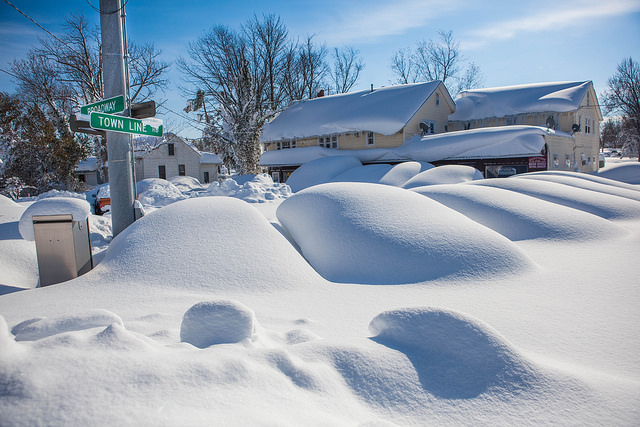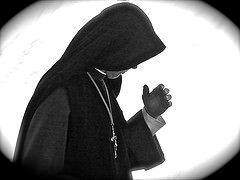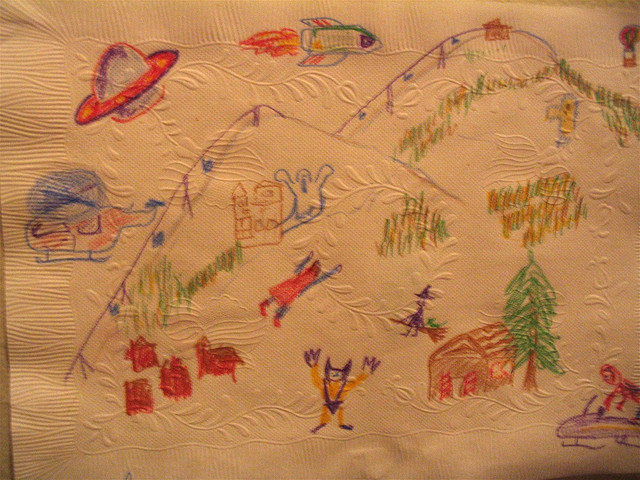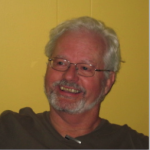Memoir Excerpt by Jeremiah Horrigan
Of Saints, Superpowers, and a Boy’s Brief Vision

In 1958, when I was eight years old, it took a lot to get a snow day in Buffalo. But the radio said this January storm had set a record. Overnight, the wind had whipped a thick new coat of powder onto crusty piles of accumulated gray, creating scalloped snow dunes as shapely as the sandy ones in my third-grade geography book.
No class for me that day—no geography book, no catechism, no being cooped up with hundreds of other prisoners in St. Martin’s Elementary School. I was set loose on a world of white, only too eager to get lost in the sparkling quiet outside.
The air shimmered with snow so fine I couldn’t see it until it passed through the heatless sunbeams that sliced the black branches of the elms that lined Turner Street. The cold shaved the edge off every sound except the high, stinging whistle of the wind and the creaky-squeak under my buckled-up rubber boots.
A snowplow lumbered down the narrow street, pushing new icy curls and old road slush into the mouths of just-shoveled driveways. It turned the corner at the end of the block, leaving me alone again in silence. I waded through a dune and broke through to the street, where something caught my eye in front of my house.
It was a blurry splotch of purple, the size of an Oreo, in the snow bank near the curb. I stopped and stared down at the splotch, which seemed to glow from within.
I caught my breath the moment I realized what it was. The newspapers and radio and, most especially, my third-grade teacher Sister Jeanne had been full of warnings about the Russians exploding nuclear bombs all over the place. When they did, Sister Jeanne intoned, radioactive fallout would get loose in the air and hurtle back to earth. Now, I knew I was gazing at a deadly patch of Communist snow.
In truth, Sister Jeanne and the other black-draped Sisters of Mercy who taught at St. Martin’s were as big a mystery to me as the Russian Communists. Most of us boys weren’t even sure if nuns were women like the lay teachers or our moms. The nuns never seemed to eat or go to the bathroom or, in Sister Jeanne’s case, smile.
 I assumed she was old. All nuns were old. Her face—what I could see of it beneath her starched white wimple—was smooth and unlined. She had a big, hooked nose and was given to what were then called “spells.” Sister Jeanne would sit staring out the bank of windows that lined our classroom wall, casually picking her nose. Then, without shifting her gaze, she’d roll what she found there between her thumb and forefinger and flick it into our midst. You wanted to stay alert in Sister Jeanne’s classroom.
I assumed she was old. All nuns were old. Her face—what I could see of it beneath her starched white wimple—was smooth and unlined. She had a big, hooked nose and was given to what were then called “spells.” Sister Jeanne would sit staring out the bank of windows that lined our classroom wall, casually picking her nose. Then, without shifting her gaze, she’d roll what she found there between her thumb and forefinger and flick it into our midst. You wanted to stay alert in Sister Jeanne’s classroom.
And I wanted to believe everything she said, because I believed I had to, even if I didn’t understand what she meant. Growing up in the Catholic Church was a lot like that—you took a lot of things on faith, or you’d go to hell. Questioning was simply out of the question.
Remember Bert Lahr’s Cowardly Lion in The Wizard of Oz, clutching his tail like a hairy rosary and declaring, “I do believe in spooks, I do, I do, I do!”? That was me at eight, believing with all my heart in whatever nuttiness the nuns told me was true. If something didn’t make sense—a tasteless wafer was God’s body and blood, dogs couldn’t go to heaven, it was a sin to call your brother a dumbhead—it would all be revealed one day, even if you’d have to die to get the answers. No one who wanted to get to heaven as desperately as I did ever questioned Sister Jeanne.
Her anti-Communism knew no bounds. During a history lesson, she once let drop that “Franklin Roosevelt and his entire cabinet were Communists.” This was fine by me, though I wondered for years how furniture could be Communist.
Her warnings against eating snow were of a piece with her other oddities. None of us boys needed to be told something so elemental. I never ate snow. None of my friends ever ate snow. We might suck on the occasional icicle, but not very often and only when we were bored.
Yet, standing in front of the glowing purple splotch in front of my house, I understood her warnings. I understood that the hollow feeling in the pit of my stomach was the first stirring of radiation poisoning, the same poison that transformed ants into man-eating monsters in movies like Them! I knew I’d been exposed, and my fate was sealed. No one would be able to come near me. No one would know they’d been exposed to me, until it was too late.
I had days to live. Maybe hours. I felt like puking—a further sign, I thought, of radiation sickness.
I scrambled up the driveway to the side of the house, where I yanked my dad’s heavy steel shovel out of a drift. My plan was simple: I’d bury the radioactivity under as much ice and slush and snow as I could. Then I'd alert everyone in the neighborhood to the danger they faced, keeping my distance as best I could, shouting my warnings and goodbyes. I would be a hero, even if I’d also be dead.
I dragged the shovel over to the purple splotch and started dumping street slush on top, then hammering the pile down with the back of the shovel. I pressed down with all my might after every scoop. The splotch disappeared under a thick rind of gray ice, but I kept at it, my breath coming in gasps. I was sweating as if it were summer, but I kept digging and piling and smoothing, digging and piling and smoothing.
I thought about the bright side of dying.
I’d be given a martyr’s funeral, of course. The whole neighborhood—whoever survived—would turn out for the high mass held in my honor. My friends would cry, finally realizing what a saintly kid I’d always been. I'd be like Cardinal Mindszenty, the Hungarian prelate whom Sister Jeanne was forever telling us had been tortured for his faith—for defying the godless Communists who ruled his country and were now poisoning the air with their bombs. I’d go immediately to heaven, all my sins forgiven. I'd be reunited with all my dead relatives, most of whom I'd never met or didn’t like. But when Mom and Dad and my dog Droopy died, we'd all be reunited. I was very glad I'd secretly baptized Droopy the summer before.
The only trouble was, I didn’t want to die. As it happened, I'd been counting on living forever. I prayed daily for God to grant me superpowers. And now, thanks to the Communists, I’d been cheated of that ever happening.
That thought made me work harder. Dig. Pile. Whomp it down. I was so hot I threw off my sodden wool coat. Dig. Pile. Whomp it down. I was mad now. Maybe it wasn’t too late. Maybe the snow and ice had neutralized the radiation, the way lead shielded Superman from Kryptonite’s deadly effects.
Dig. Pile Whomp it down. I wasn’t going down without a fight. I took a giant cut of slush from the curbside. What I saw there made me drop the shovel.
There. Down near the curb. A spot of foggy-green snow—even bigger than the purple splotch. Fear seized my throat like one of my grandfather’s poisonous mentholated cough drops. The radiation was everywhere. It came in all colors.
Fighting back tears, I scratched at the green spot with the hopelessly irradiated shovel. The blur grew sharper. What I saw then made me gasp. I fell to my knees.
Christ.
It was glowing, almost pulsing, in the midst of the green. A holy word, the holiest word there was. I crossed myself. It could only be a message from God.
I no longer feared death. If I still had to die, I knew I wouldn’t be forgotten. I’d be a saint, like those little kids at Fatima. Or Saint Bernadette of Lourdes.
Saint Jeremiah of Buffalo.
I gazed at the green spot. There it was, that single word, written in the kind of fancy lettering I knew God would favor.
Christ.
I tore off my mittens. Carefully, as if trying to capture a spider sleeping in its web, I dug my hands around and behind the icy snow that held the green, thinking to cradle it up into the air. I was sure there had to be more words to the message—directions, a prayer, a warning about Communism—something more than just the name of God’s only begotten Son. Maybe the full message would confirm my prayers and grant me superpowers. Maybe that’s what all these splotches had been: answers to my prayers.
 Everything I knew about sainthood came rushing into my brain—images of skinny, bearded men with upraised eyes gazing at the heavens; beams of light pouring down through clouds; swelling pipe organs; heavenly choruses. I felt like Hal Jordan, my favorite comic book superhero, who said these words to become Green Lantern:
Everything I knew about sainthood came rushing into my brain—images of skinny, bearded men with upraised eyes gazing at the heavens; beams of light pouring down through clouds; swelling pipe organs; heavenly choruses. I felt like Hal Jordan, my favorite comic book superhero, who said these words to become Green Lantern:
In brightest day, in blackest night,
No evil shall escape my sight!
Let those who worship evil’s might
Beware my power—Green Lantern’s light!
I already had a superhero name picked out for myself. I would be The Holy Terror—what Sister Jeanne called a boy named David in my class, a kid whose willingness to talk back to her was something I deeply admired but couldn’t bring myself to imitate.
My hands passed right through the lump of snow. They didn’t even feel cold. My superpowers were already kicking in. I would be immune to cold weather! No longer subject to the rules of mortal men! No more homework, no more early bedtimes, no more walking Droopy! I would fly over the parish, waving at my disbelieving friends, thoughtfully melting the snow off their parents’ driveways with my heat vision. I’d be sure to visit an eighth-grader named Herman, the hulk who tormented me in altar-boy Latin class, so I could punch his lousy face into mush.
All I had to do was retrieve the rest of God’s message. I dug a little deeper into the snow, inching my fingers beneath the sacred spot, until I felt something—something delicate—give. Carefully, so carefully, I scooped up and drew the green snow close to my chest, peering at it, doing my best not to accidentally scorch it with my heat vision. There were more words in the same fancy lettering. I held my breath. What my eyes told me my mind at first refused to believe.
No. It couldn’t be.
I was holding a strip of soggy paper. Soggy green paper. Soggy green wrapping paper with the words Merry Christmas emblazoned all over it.
I flung it away and tore into the crusty purple spot, where I found the same message along with wishes for a Happy New Year!
I got up, my knees suddenly freezing. But my fingers burned as hotly as my thoughts. I’d been on the brink of understanding how everything—God, me, heaven, superheroes—fit together. It had all looked so beautiful. My parents would have been proud to see me reborn and powerful, flying around as if nothing had happened. I would have told everyone not to cry, that I’d be right back after The Holy Terror had rained fierce vengeance down on the heads of Russia’s Communists.
As I trudged back to the house, trailing the heavy steel shovel, I recall thinking how much I wanted to rain a little vengeance down on Sister Jeanne’s head. Still, fantasy and the sense of hope it feeds on has always died hard with me. I went on believing in God and praying for superpowers, just as I went on attending mass and being a good boy in school, always doing what I was told.
But there came a time when questions large and small were overwhelming. Why did Old Yeller have to die? Why did my father get cancer? Why couldn’t I wear my hair as long as I wanted? And why oh why, if I decided not to go to college, did I have to go fight godless Communists in Vietnam instead?
Not a decade after I walked away from my vision in the snow, I walked into my first antiwar protest. A few years later, bursting with angry questions no one in authority could answer, I grew my hair, smoked some dope, dropped out of college, and nearly went to prison for my antiwar activities. The papers called me a member of the Catholic radical left, and they were right. Soon I became a father without becoming a husband. Droopy had a better chance at making heaven than my unbaptized son and daughter. For a time, I broke every rule and asked every question a black-draped, cold-hearted, and allegedly religious world could throw at me.
Yet sometimes, I think I should thank Sister Jeanne for setting me on the path I couldn’t have anticipated as a boy. God didn’t grant me sainthood or superpowers. But the cockamamie world He created, the one Sister Jeanne helped blindly maintain, finally made a holy terror out of me.
Like what you're reading? Click Donate to Talking Writing.
Support a great nonprofit magazine—and vote for a theme next year!
Publishing Information
- "Reciting the Green Lantern Oath" by Chris Arrant, Comic Book Resources, May 19, 2011; the oath that appears here is the 1940 original from DC Comics.
- “Dogs in Heaven? Pope Francis Leaves Pearly Gates Open” by Rick Gladstone, New York Times, December 11, 2014.
Art Information
- "Historic Lake Effect Snow in Buffalo New York Area" © Anthony Quintano; Creative Commons license.
- "Nun Deep in Prayer" © Robert Frank Gabriel; Creative Commons license.
- "Steamboat Superheroes" © Hannah; Creative Commons license.
 Jeremiah Horrigan is a contributing writer at Talking Writing, a prize-winning newspaper reporter, and author of Fortunate Son: A Father, a Son and the War on the Home Front. His work has appeared in the New York Times, Sports Illustrated, and Salon. His most recent essays can be found at the Huffington Post.
Jeremiah Horrigan is a contributing writer at Talking Writing, a prize-winning newspaper reporter, and author of Fortunate Son: A Father, a Son and the War on the Home Front. His work has appeared in the New York Times, Sports Illustrated, and Salon. His most recent essays can be found at the Huffington Post.
Jeremiah says no sooner did he file “The Holy Terror” than a colleague told him Pope Francis had declared that animals go to heaven. Various online sites and papers, including the New York Times, reported that the pontiff declared this while trying to comfort a boy who was upset about the death of his pet dog. Turns out it didn’t happen and Pope Francis was misquoted. Still, Jeremiah notes:
While this is sure to spark ecclesiastical debate (are we talking dog heaven here? do cats have souls? what about dinosaurs?), I can't help but wonder what path my life might have taken if Pope Francis had been in charge in 1958. This much I know: Sister Jeanne would have blown a gasket.
This excerpt from Jeremiah's memoir Fortunate Son (the chapter called "Communist Snow") has been revised for TW.
